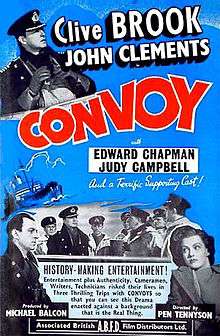Convoy (1940 film)
| Convoy | |
|---|---|
 Original UK poster | |
| Directed by | Pen Tennyson |
| Produced by | Michael Balcon |
| Written by |
Patrick Kirwan Pen Tennyson |
| Starring |
Clive Brook John Clements Edward Chapman Judy Campbell |
| Music by | Ernest Irving |
| Cinematography |
Roy Kellino Günther Krampf |
| Edited by | Ray Pitt |
Production company | |
| Distributed by |
ABFD (UK) RKO Pictures (US) |
Release dates |
|
Running time |
90 minutes 78 minutes (US) |
| Country | United Kingdom |
| Language | English |
Convoy is a 1940 British war film, produced by Ealing Studios, directed by Pen Tennyson and starring Clive Brook, John Clements and Edward Chapman. It was Tennyson's last film before being killed in a plane crash.[2]
Plot summary
A Royal Navy cruiser returns to base to find all leave has been cancelled and they are to start out straight away for a special mission. Supplemented with a new 1st officer, who turns out to have caused the captain's divorce a few years earlier, they are sent to meet a convoy in the North Sea and escort it safely into British coastal waters. One stubborn freighter captain, who has the cargo hold full of refugees, mainly Jews, refuses to join the convoy and is captured by a U-boat which sets a trap for the convoy escort. One of the passengers is the former wife of the cruiser's captain, as well as the former lover of its 1st officer, and this is something the Germans make use of when sending urgent messages from the freighter, claiming it is sinking and naming her as one of the passengers. When the ex lover takes the bite and tries to send a destroyer to the freighter's rescue, the captain locks him up, as all ships must protect the convoy. Eventually, a North Sea patrol destroyer comes to the rescue instead, sinks the U-boat and takes the freighter on tow to the convoy, where the captain and his ex-wife meet and come to an understanding.
However, the German pocket battleship Deutschland soon emerges and, although his cruiser is hopelessly outgunned, the captain decides to attack in order to keep the battleship away from the convoy until British battleships arrive. During the battle, the captain and his wife's former lover reconciles before the ex lover dies trying to save the ship. The British battleships arrive at the last minute.
Main cast
- Clive Brook as Captain Tom Armitage
- John Clements as 1st Officer - Lt David Cranford
- Edward Chapman as Capt Eckersley
- Judy Campbell as Lucy Armitage
- Penelope Dudley-Ward as Mabel
- Edward Rigby as Mr Matthews
- Charles Williams as Shorty Howard
- Allan Jeayes as Cmdr. Blount
- Michael Wilding as Dot
- Harold Warrender as Lt. Cmdr. Martin
- David Hutcheson as Capt Sandeman
- George Carney as Bates
- Al Millen as Knowles
- Charles Farrell as Walker
- John Laurie as Gates
- George Benson as Parker
- Hay Petrie as Minesweeper skipper
- Mervyn Johns as Minesweeper's mate
- Albert Lieven as U-Boat commander
- John Wengraf as Cmdr. Deutschland
- Edward Lexy as Merchantman skipper
- John Glyn-Jones as Merchantman's mate
- Patrick Holt as Holt
- Stewart Granger as Sutton
Soundtrack
The music is by Ernest Irving and includes a slowed down version of "Rule, Britannia!".
Release
The film premiered at the New Gallery Cinema in London on 5 July 1940, as part of a double bill with The Saint's Double Trouble.[1]
The reviewer in The Times wrote that "this film up to a point succeeds in giving some idea of the work implied in the title. The pity is that it did not go farther, risk the charge of being labelled documentary". but concluded that the film "has some substantial merits to set against its lack of austerer virtues."[3]
After the film had opened at the Rialto in New York City in January 1941, the reviewer in The New York Times wrote, "if the film fails in its frankly propagandistic mission it is because of spurious craftsmanship and because it is a little too self-consciously heroic. British seamen deserve a document more honest than this...The authenticity of some actual shots at sea he (Michael Balcon) has compromised by dovetailing them with scenes in which model cruisers and destroyers fight a furious but obvious duel in a studio tank. The actors, including Clive Brook and John Clements, are all so teddibly British in the face of grave danger that their calm becomes unconvincing."[4]
References
- 1 2 The Times, 5 July 1940, page 6, Picture Theatres: New Gallery: Clive Brook, John Clemens in "Convoy" Linked 2015-11-21
- ↑ "BFI Screenonline: Tennyson, Pen (1912-1941) Biography". screenonline.org.uk.
- ↑ The Times, 8 July 1940, page 6: New films in London Linked 2015-11-21
- ↑ The New York Times, 17 January 1941: "Movie Review: Convoy" Relinked 2015-11-21
External links
- Convoy in the British Film Institute's "Explore film..." database
- Convoy at the Internet Movie Database
- Convoy is available for free download at the Internet Archive
Bibliography
- Perry, George. Forever Ealing. Pavilion Books, 1994.